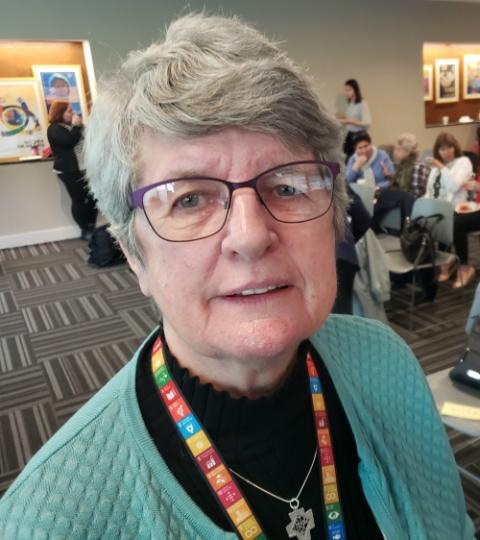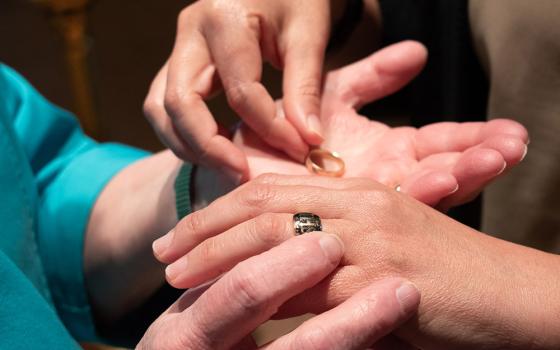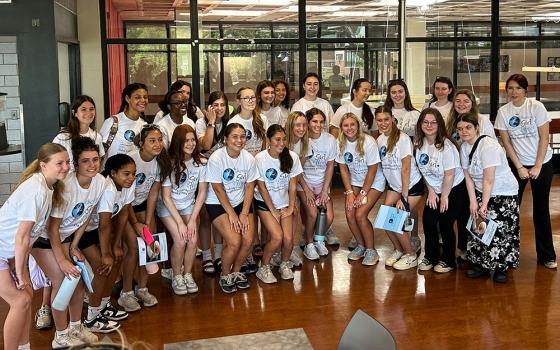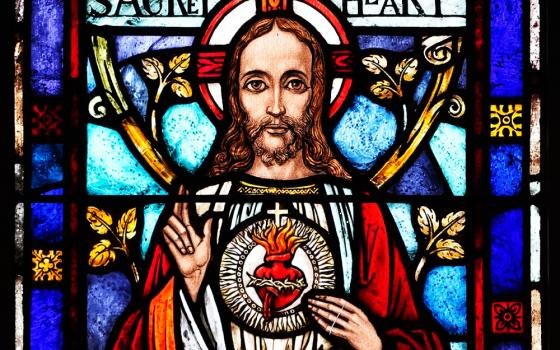
A Feb. 14 meeting of the Civil Society Forum during the U.N.'s Commission for Social Development meetings about homelessness and affordable housing (GSR photo / Chris Herlinger)

(GSR/Toni-Ann Ortiz)
Editor's note: More than 1.6 billion people worldwide live in substandard housing. Of those, at least 150 million have no home at all. In this special series, A Place to Call Home, Global Sisters Report is focusing on women religious helping people who are homeless or lack adequate shelter. Over the next several months, we will examine how homelessness and a lack of affordable housing affect teens and young adults, families, migrants, the elderly and those displaced by natural disasters and climate change in stories from Kenya, India, Vietnam, Ireland, Puerto Rico, the Philippines, the United States and elsewhere.
Catholic sisters who have worked for more than two years in getting the United Nations to address the issue of homelessness and affordable housing are hailing 10 days of meetings that resulted in an outcome document they say affirmed many of their concerns about a growing global problem.
"We're actually happy with it. It's historic that there's a U.N. resolution on homelessness," said Daughter of Wisdom Sr. Jean Quinn, executive director of UNANIMA International, a U.N.-based coalition of Catholic congregations focused on concerns of women, children, migrants and the environment.
"It's a milestone," said Sr. Margaret O'Dwyer, one of two representatives of the Company of the Daughters of Charity at the United Nations and who, with Quinn, shares the title of co-chair of the nongovernmental organization Working Group to End Homelessness, an advisory group of religious congregations and other organizations.
"Hopefully, it will prompt countries to take greater action on homelessness," O'Dwyer said in a joint interview with Quinn at the conclusion of the Feb. 10-19 meetings of the 46-member Commission for Social Development, held at U.N. headquarters in New York City.
"We think that we achieved the best outcome we could, considering the number of countries involved in negotiations and the different realities they experience in terms of homelessness," O'Dwyer said.
The outcome document affirms several of the points sisters and others had advocated before and during the commission meetings.
"The resolution includes a description of homelessness and reference to demographics, which addresses two of our key concerns," O'Dwyer said. "Our next step is to explore how various countries might implement the resolution."
The resolution will now be submitted to the United Nations' Economic and Social Council for approval. Some of the text may then go to the U.N.'s General Assembly for approval, O'Dwyer said.
The document's description of homelessness affirms a "working definition" that Quinn and other experts meeting in May 2019 in Nairobi, Kenya, had put forth: Homelessness is "a condition where a person or household lacks habitable space with security of tenure, rights and ability to enjoy social relations, including safety."
The final language agreed upon by the commission notes that homelessness "is not merely a lack of physical housing, but is often interrelated with poverty, lack of productive employment and access to infrastructure, as well as other social issues that may constitute a loss of family, community and a sense of belonging."
Advertisement
The document further says that homelessness, depending on a national context, "can be described as a condition where a person or household lacks habitable space, which may compromise their ability to enjoy social relations, and includes people living on the streets, in other open spaces or in buildings not intended for human habitation, people living in temporary accommodation or shelters for the homeless, and, in accordance with national legislation, may include, among others, people living in severely inadequate accommodation without security of tenure and access to basic services."
Another affirmation is that the document calls upon members of the United Nations to collect data "related to homelessness and establish categories of homelessness, accompanying the existing measurement tools, and encourages member states to harmonize the measurement and collection of data on homelessness to enable national and global policymaking."
While that is not an explicit call for a "global census" on homelessness, it does put the United Nations on record as saying that data at local and national levels must be better collected and that a common set of measurements should be used.
During the commission meetings, Quinn, O'Dwyer and other advocates noted that given the parameters of the global homelessness problem — it is estimated that at least 150 million people have no home and that 1.6 billion people worldwide live in substandard housing — it is important that a common definition be found for homelessness and that a common set of data be used for a global response.
"If you have a count, you can assess your progress," O'Dwyer said.
The document also affirmed another advocacy point made by sisters and others: While affordable policies are important, they cannot be promoted in isolation and must be part of national social protection efforts focused on preventing poverty and other social ills.
Quinn said she felt the commission had grasped another argument — the need to emphasize "home" as being more than a house.
"I love that idea, that it's much more than a structure," she said.
O'Dwyer said another reason for the meetings' success was due to the good working relationship between the nongovernmental organizations and the U.N. members on the issue.
"Our 'call' is to work with the member states," she said, noting the strong role that African nations, in particular, took in taking up the issue of homelessness. (The commission sets a yearly topic to examine; in 2021, the topic will be the role of digital technologies in advocating for social development.)
Hanta Fida Cyrille Klein, a diplomat from Madagascar's Permanent Mission to the United Nations, is among those advocates praised for her work prior and during the commission meetings. In an interview with GSR at the conclusion of the hearings, Klein noted that African members of the commission took the lead in initiating the topic as a priority, noting that the problem needs to be addressed not only in Africa, but globally.
"The issue is there. We have to open our eyes [at the global level] that homelessness needs to be addressed," she said.
On collecting data, Klein said the commission doesn't have the mandate to ask for an international census of homelessness, and added that data will have to be collected at the national level. But she said it is possible that the United Nations Statistical Commission might have some role that links data with global policymaking.
On this and other issues, the commission's work is "a solid basis to start with," Klein said. "At least now, we have a starting point. It's a huge accomplishment."
Klein praised religious congregations in her own country for their work in addressing homelessness and said religious congregations working at the United Nations should be commended for their dedication in advocating for those facing homelessness.
"There has been a huge commitment on this issue by Catholic sisters," she said.
Sisters had a prominent role throughout the 10 days of meetings, attending and participating in the formal U.N. sessions and organizing side events that dealt with numerous topics related to homelessness.

Sr. Ann Marie Quinn, who serves as the executive director of the International Presentation Association, was a ubiquitous presence throughout the U.N.'s Commission for Social Development Feb. 10-19 meetings about homelessness. (GSR photo / Chris Herlinger)
Sr. Ann Marie Quinn, who serves as the executive director of the International Presentation Association, was a ubiquitous presence throughout the meetings. She said the global focus on homelessness was evident in both the attention paid to the problem by the U.N. member states and in the participation of religious congregations and nongovernmental organizations from throughout the world.
She hailed the leadership of the African countries on the issue, calling it a "very positive move."
"We're all driven by what happens in our 'home base,' " she told GSR.
And yet, there are global links, she and others said. A report by U.N. Secretary-General António Guterres was often quoted during the meetings. His 19-page report, among other things, noted a concern that housing and anti-homelessness advocates like the Catholic sisters continue to raise: the "commodification" of housing.
"In many countries, there is an emerging phenomenon in which housing is treated as a commodity and a financial tool to increase returns on capital investment. As a result, housing has been increasingly commodified," the report said.
"This does not change the nature of housing as a social good, a place to live and raise families or that adequate housing is a part of people's inalienable human rights. Yet, investors search for underdeveloped properties in both developed and developing countries to leverage profits, without considering the needs of local residents. As a result, the costs of housing have doubled or tripled."
Quoting figures from the International Monetary Fund, the report noted that in 2018, "the global real house price index reached its highest level since 2000 and house prices have grown twice as fast as inflation."
These and other concerns animated the 10 days of meetings, which drew many policy experts as well as those who have experienced homelessness themselves. This prompted Sr. Jean Quinn to describe the meeting as a unique combination of "passion and compassion."
As for the global policy ramifications, Quinn said she could not be more pleased: "There's no going back now."
[Chris Herlinger is GSR international correspondent. His email address is cherlinger@ncronline.org.]








